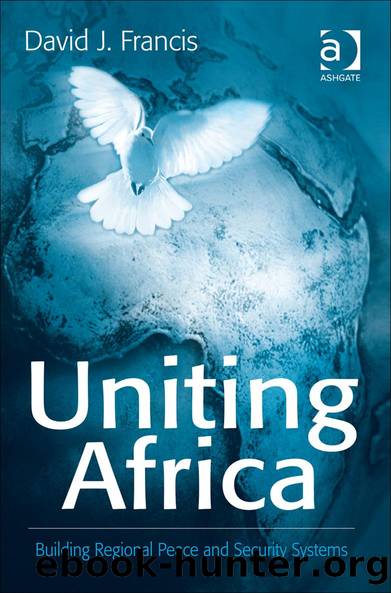Uniting Africa by David J. Francis

Author:David J. Francis [Francis, David J.]
Language: eng
Format: epub
Tags: Social Science, Sociology, General, Political Science, Security (National & International)
ISBN: 9781351876742
Google: YQTFDwAAQBAJ
Barnesnoble:
Goodreads: 3210356
Publisher: Routledge
Published: 2006-02-22T00:00:00+00:00
Regional Hegemons and the Maintenance of Peace and Security in Africa
Understanding the role and contribution of regional hegemons is important to the emerging phenomenon of regionalisation of conflict management and the maintenance of peace and security in Africa. The role of regional hegemons, either positive or negative, is an important consideration on issues relating to peace and security. But do regional hegemons provide or guarantee security? Is it in their interest to promote the maintenance of regional peace and security? One would also want to know âfor whomâ and for âwhat purposeâ is the putative security provided? Goldstein defines hegemon as having the ability and capacity to âdictate, or at least dominate, the rules and arrangements by which international relations, political and economic are conductedâ.28 Hegemony is defined and constructed differently by neo-Gramscian scholars. Constructionists focus on the idea of hegemony as a source of power.29 A hegemonic situation is when a single great power or state develops a sufficient preponderance of material resources (i.e. military capability, economic and financial wealth, security, power etc.) so that it can dominate. This preponderant position gives the hegemon the ability to promote rules for the whole global/regional system, that protect the hegemon's own interests. Important considerations for the definition and construction of hegemons include size, population, economic strength, military might, ideas and political will. Derived from the conceptualisation of hegemonic stability thesis, which Kegley and Wittkoft describe as a blend of liberalism and mercantilism. It maintains that, when a hegemon ascends so that the preponderance of military and economic power is held in the hands of a single state, international economic stability based on liberal principles can materialise to alleviate the fear of nationalistic mercantilists30 This liberal economic interpretation assumes that order and stability in the global economic order is possible when an all-powerful single hegemon uses its position to enforce free-trade rules, and as such sustains the system through the actions of the dominant economy.31
The economic conception of hegemonic stability thesis has been given political and security interpretations in the provision of collective or public good such as peace and security. This essentially realist conception assumes that co-operation to provide a public good is difficult, hence the system needs a single, dominant power â a hegemon â to provide this. The theory suggests the need for leadership of a country that is prepared, according to Charles Kindleberger, âconsciously or unconsciously ⦠to set standards of conduct for other countries, and to seek to get others to follow them, to take on an undue share of the burdens of the system, and in particular to take on its support in adversityâ.32 It is further argued that co-operation is possible, but not sustainable, and such co-operation becomes âpositive sumâ because both sides benefit. Relevant to the understanding of hegemonic stability is the role played by regimes, norms, rules and institutions in the maintenance of international peace and security. Robert Keohane, therefore, argues that hegemonic structures of power, dominated by a single country, are most
Download
This site does not store any files on its server. We only index and link to content provided by other sites. Please contact the content providers to delete copyright contents if any and email us, we'll remove relevant links or contents immediately.
The Secret History by Donna Tartt(18058)
The Social Justice Warrior Handbook by Lisa De Pasquale(11930)
Thirteen Reasons Why by Jay Asher(8399)
This Is How You Lose Her by Junot Diaz(6401)
Weapons of Math Destruction by Cathy O'Neil(5779)
Zero to One by Peter Thiel(5444)
Beartown by Fredrik Backman(5293)
The Myth of the Strong Leader by Archie Brown(5204)
The Fire Next Time by James Baldwin(4987)
How Democracies Die by Steven Levitsky & Daniel Ziblatt(4932)
Promise Me, Dad by Joe Biden(4890)
Stone's Rules by Roger Stone(4819)
100 Deadly Skills by Clint Emerson(4647)
Rise and Kill First by Ronen Bergman(4528)
A Higher Loyalty: Truth, Lies, and Leadership by James Comey(4520)
The David Icke Guide to the Global Conspiracy (and how to end it) by David Icke(4348)
Secrecy World by Jake Bernstein(4342)
The Farm by Tom Rob Smith(4294)
The Doomsday Machine by Daniel Ellsberg(4221)
